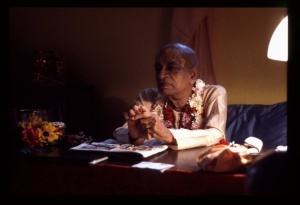CC Adi 8.72 (1975): Difference between revisions
(Vanibot #0027: CCMirror - Mirror CC's 1996 edition to form a basis for 1975) |
(Vanibot #0020: VersionCompareLinker - added a link to the Version Compare feature) |
||
| Line 2: | Line 2: | ||
<div style="float:left">'''[[Sri Caitanya-caritamrta (1975)|Śrī Caitanya-caritāmṛta (1975)]] - [[CC Adi (1975)|Ādi-līlā]] - [[CC Adi 8 (1975)|Chapter 8: The Author Receives the Orders of Kṛṣṇa and Guru]]'''</div> | <div style="float:left">'''[[Sri Caitanya-caritamrta (1975)|Śrī Caitanya-caritāmṛta (1975)]] - [[CC Adi (1975)|Ādi-līlā]] - [[CC Adi 8 (1975)|Chapter 8: The Author Receives the Orders of Kṛṣṇa and Guru]]'''</div> | ||
<div style="float:right">[[File:Go-previous.png|link=CC Adi 8.71 (1975)|Ādi-līlā 8.71]] '''[[CC Adi 8.71 (1975)|Ādi-līlā 8.71]] - [[CC Adi 8.73 (1975)|Ādi-līlā 8.73]]''' [[File:Go-next.png|link=CC Adi 8.73 (1975)|Ādi-līlā 8.73]]</div> | <div style="float:right">[[File:Go-previous.png|link=CC Adi 8.71 (1975)|Ādi-līlā 8.71]] '''[[CC Adi 8.71 (1975)|Ādi-līlā 8.71]] - [[CC Adi 8.73 (1975)|Ādi-līlā 8.73]]''' [[File:Go-next.png|link=CC Adi 8.73 (1975)|Ādi-līlā 8.73]]</div> | ||
{{CompareVersions|CC|Adi 8.72|CC 1975|CC 1996}} | |||
{{RandomImage}} | {{RandomImage}} | ||
==== TEXT 72 ==== | ==== TEXT 72 ==== | ||
| Line 32: | Line 31: | ||
<div class="purport"> | <div class="purport"> | ||
To write about the transcendental pastimes of the Supreme Personality of Godhead is not an ordinary endeavor. Unless one is empowered by the higher authorities, or advanced devotees, one cannot write transcendental literature, for all such literature must be above suspicion, or, in other words, it must have none of the defects of conditioned souls, namely mistakes, illusions, cheating and imperfect sense perceptions. The words of Kṛṣṇa and | To write about the transcendental pastimes of the Supreme Personality of Godhead is not an ordinary endeavor. Unless one is empowered by the higher authorities, or advanced devotees, one cannot write transcendental literature, for all such literature must be above suspicion, or, in other words, it must have none of the defects of conditioned souls, namely, mistakes, illusions, cheating and imperfect sense perceptions. The words of Kṛṣṇa and the disciplic succession that carries the orders of Kṛṣṇa are actually authoritative. To be empowered to write transcendental literature is a privilege in which a writer can take great pride. As a humble Vaiṣṇava, Kṛṣṇadāsa Kavirāja Gosvāmī, being thus empowered, felt very much ashamed that it was he who was to narrate the pastimes of Lord Caitanya Mahāprabhu. | ||
</div> | </div> | ||
Latest revision as of 19:49, 26 January 2020

A.C. Bhaktivedanta Swami Prabhupada
TEXT 72
- more ājñā karilā sabe karuṇā kariyā
- tāṅ-sabāra bole likhi nirlajja ha-iyā
SYNONYMS
more—unto me; ājñā—order; karilā—gave; sabe—all; karuṇā—merciful; kariyā—doing so; tāṅ-sabāra—of all of them; bole—by the order; likhi—I write; nirlajja—without shame; ha-iyā—becoming.
TRANSLATION
By their mercy, all these devotees ordered me to write of the last pastimes of Śrī Caitanya Mahāprabhu. Because of their order only, although I am shameless, I have attempted to write this Caitanya-caritāmṛta.
PURPORT
To write about the transcendental pastimes of the Supreme Personality of Godhead is not an ordinary endeavor. Unless one is empowered by the higher authorities, or advanced devotees, one cannot write transcendental literature, for all such literature must be above suspicion, or, in other words, it must have none of the defects of conditioned souls, namely, mistakes, illusions, cheating and imperfect sense perceptions. The words of Kṛṣṇa and the disciplic succession that carries the orders of Kṛṣṇa are actually authoritative. To be empowered to write transcendental literature is a privilege in which a writer can take great pride. As a humble Vaiṣṇava, Kṛṣṇadāsa Kavirāja Gosvāmī, being thus empowered, felt very much ashamed that it was he who was to narrate the pastimes of Lord Caitanya Mahāprabhu.